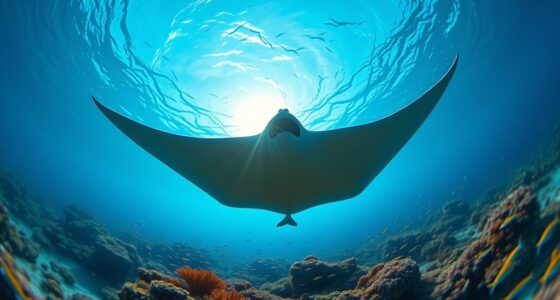Recent discoveries reveal that some fish can recognize themselves in mirrors, which suggests they possess a level of self-awareness once thought to be limited to humans and certain primates. You might see fish inspecting their reflections or even trying to remove marks they’ve seen in the mirror, actions indicating they understand the reflection belongs to them. If you keep exploring, you’ll uncover even more fascinating insights into what these behaviors say about fish intelligence and consciousness.
Key Takeaways
- Fish approaching and inspecting their mirror reflection suggest recognition beyond curiosity.
- Behaviors like mark removal or behavioral changes indicate awareness that the reflection is themselves.
- Mirror self-recognition demonstrates complex mental processes, including perception and self-awareness.
- Such abilities in fish challenge the belief that self-awareness is limited to primates and humans.
- These findings imply that self-recognition in mirrors is a sign of higher cognitive development across species.

Many people assume that self-awareness is a trait unique to humans or a few animals, but recent research shows that some fish can recognize themselves in mirrors. This discovery challenges long-held beliefs about the cognitive abilities of aquatic creatures and raises questions about what it truly means to be self-aware. When you observe a fish responding to its mirror reflection, you might think it’s just reacting to a visual stimulus. However, these responses suggest a deeper level of cognition. The fish isn’t simply seeing another fish; it appears to understand that the reflection belongs to itself. This ability, often called mirror self-recognition, indicates a level of mental processing that was once thought impossible for fish.
Some fish can recognize themselves in mirrors, challenging our ideas of animal intelligence and self-awareness.
By watching a fish approach its mirror, you can notice behaviors that go beyond mere curiosity. Some fish will inspect their bodies, attempt to remove marks, or even change their behavior after seeing their reflection. These actions imply that the fish has a concept of self and can distinguish its own image from other animals or objects. Such behaviors reveal a remarkable range of cognitive abilities that extend past simple instinct or reflex. Instead, they suggest that these fish are capable of more complex mental processes, including self-awareness.
Understanding the significance of the mirror reflection in these fish helps you realize that recognizing oneself is not exclusive to humans or primates. If a fish can assess its own image, then self-awareness might be more widespread in the animal kingdom than previously thought. The ability to interpret a mirror reflection demonstrates advanced perception—it’s not just about seeing, but about understanding what you see. This cognitive ability involves memory, recognition, and an internal sense of identity, qualities we typically associate with higher intelligence. Additionally, the presence of self-recognition in fish suggests that cognitive complexity may be more common across different species than traditionally believed.
In essence, these fish are showing that they possess a form of consciousness, at least enough to recognize themselves in a mirror. This recognition points to a sophisticated level of cognitive development, one that requires more than just reacting to stimuli. It involves mental representation and self-perception. By studying these behaviors, researchers are opening new avenues for understanding animal intelligence. For you, this insight reminds us that the animal world is full of surprises, and that the capacity for self-awareness might be more common across species than we ever imagined. It’s a compelling reminder of the complexity of life beneath the water’s surface and the importance of reevaluating what we consider intelligent behavior.
Frequently Asked Questions
Do All Fish Species Recognize Themselves in Mirrors?
You might wonder if all fish species recognize themselves in mirrors. Not all do; mirror learning varies based on their cognitive complexity. Some species, like cleaner fish, show signs of self-awareness, indicating they can understand reflections. Others lack this ability, suggesting limited mirror recognition. Your curiosity highlights the diverse cognitive skills among fish, revealing that self-recognition depends on each species’ cognitive capacity and their experience with mirrors.
How Does Mirror Recognition Differ Among Aquatic Animals?
You might find it fascinating that only a few aquatic animals, like some fish, dolphins, and elephants, demonstrate mirror recognition, indicating advanced self-awareness. This ability relies on the visual cortex and sensory integration, which vary among species. Unlike fish, dolphins show high levels of this skill, highlighting differences in brain structure and cognitive development. Recognizing oneself in a mirror reveals complex neural processes that differ widely across aquatic animals.
Can Fish Use Mirrors to Improve Their Behavior or Health?
You might wonder if fish can use mirrors to improve their behavior or health. Mirror training can serve as a tool for behavioral enhancement, helping fish reduce stress and develop social skills. By exposing them to their reflections, you can encourage natural behaviors and monitor their responses. This simple method allows you to support their well-being and promote healthier, more active fish in your care.
What Neurological Processes Enable Self-Recognition in Fish?
Imagine that only 2% of animals, including some fish, can recognize themselves in mirrors. You should know that this ability hinges on complex neural pathways and sensory integration. These processes allow the brain to connect visual information with self-awareness. When fish see their reflection, their neural pathways activate, enabling self-recognition. This illustrates that their brains process visual cues and create an internal image, showing a surprising level of cognitive sophistication.
Are There Ethical Implications for Keeping Fish With Mirrors?
When you consider keeping fish with mirrors, you should think about the ethical considerations involved. Using mirrors can impact their welfare, potentially causing stress or confusion. You’re responsible for their well-being, so it’s important to weigh whether the benefits outweigh the welfare concerns. Ensuring their environment promotes health and reduces stress is key, and you should always prioritize their natural behaviors and comfort in your care practices.
Conclusion
So, you see, fish spotting their reflection isn’t just a trick—it’s a glimpse into a mind capable of self-awareness, like opening a secret door to consciousness. If fish can recognize themselves in mirrors, then maybe, just maybe, the ocean’s most underestimated creatures are smarter than we ever imagined. This discovery could revolutionize how you see aquatic life, proving that the underwater world holds mysteries more astonishing than a thousand sci-fi stories.









